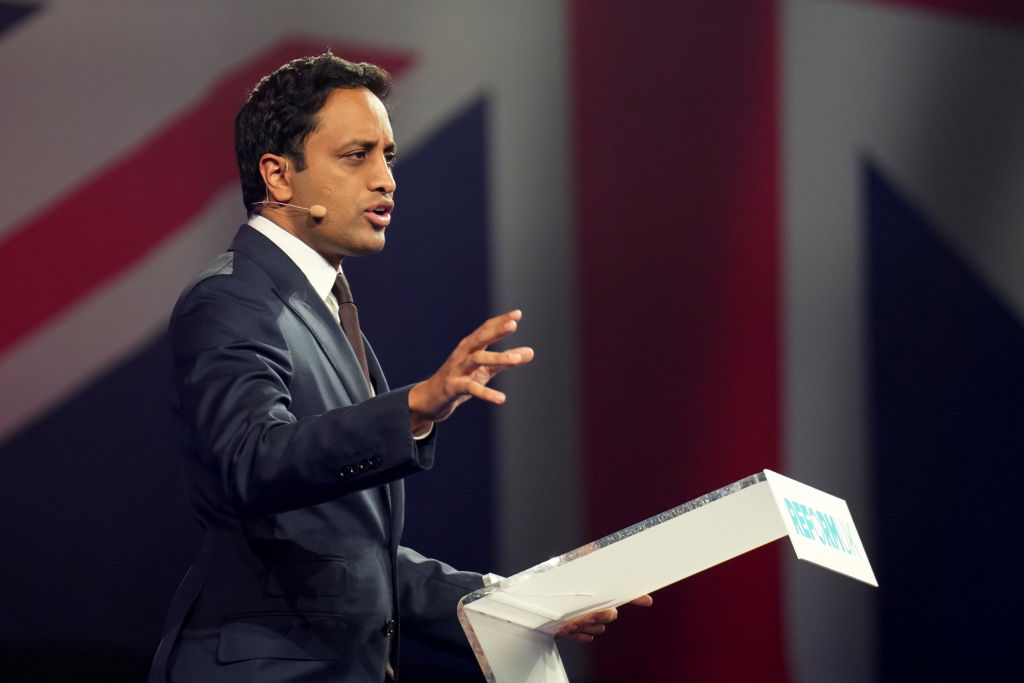“The ravens really are leaving the tower” was the Spectator’s assessment on Tuesday night of the departure of Reform UK’s veteran spin doctor, Gawain Towler. Having served Nigel Farage’s previous vehicles Ukip and the Brexit Party, Towler was this week fired after 20 years of service — much to the sorrow of Westminster journalists, to whom he had become a familiar and respected figure.
Though Reform has not yet specified the reason for the sacking, it would appear to be part of the party’s strategy to “professionalise” its operation, which would include vetting candidates more thoroughly after several scandals in the run-up to July’s general election. There are also plans to develop branch associations and hire regional directors around the country, though no significant shifts in policy have been announced since the election.
Leading this revamp is Zia Yusuf, a 37-year-old businessman who was appointed Reform’s chairman a week after July’s vote. The previous month, he had become the party’s single biggest donor after providing a reported £200,000 in funding. Later in June, Yusuf came to wider attention when he addressed several thousand Reform supporters at a rally in Birmingham, giving a speech extolling the importance of “British values” and referring to his parents’ background as migrants to the UK from Sri Lanka. He has been tipped, including by Farage himself, as a future party leader.
With Reform’s membership exceeding 85,000 this week, Yusuf’s mission is to develop a modern, sophisticated party which can build on its present tally of five MPs. Earlier this month, the multi-millionaire entrepreneur explained that Farage “knows what I’ve achieved in business in terms of scaling a startup to grow 1000s of per cent in a short number of years”. Farage last week relinquished ownership of Reform, claiming that he would be “handing the big decisions over to the members” — including allowing them to draw up the party’s constitution.
A former Conservative member, Yusuf is conscious of the risks that can befall large parties. When I interviewed him after the Birmingham rally in June, he told me that Reform would not be as vulnerable to infighting as the ever-fractious Tories because “this party is very clear about what it stands for.”
As for what Reform “stands for”, many party supporters would have been under the impression that Towler’s approach to politics and vision for Reform were largely in line with Farage’s, combining old-fashioned Euroscepticism with a focus on reaching “left-behind” voters across the UK. While he is now out of the team, the communications strategist instructed his social media followers yesterday: “Don’t leave Reform, there is so much to do.” A party source backed up this stance, informing me on Wednesday that Towler is “100% onside. He’s just not inside anymore.” A former Reform staffer, who has worked for the party within the last year, told me that “Gawain was excellent at leading a guerrilla operation, but that just doesn’t work for a party in Westminster.”
If Reform really is moving onto bigger things, that will necessitate targeting Labour, having successfully eaten into the Tory vote share. Taking seats off Keir Starmer’s party is a stated aim of Farage and Yusuf, and the latter has been notably outspoken for a party chairman, accusing the Government of “inciting” this summer’s riots and “sow[ing]” division among the British people”. Challenging a party with over 400 seats, while Reform has just five, will take extensive work on the ground, and Yusuf told me in June that the process would be akin to his experience working with tech start-ups: “sometimes difficult, but very exciting”.
Towler, for his part, appeared to be on board with this new strategy. When I spoke to him last week, shortly before Reform’s annual conference on Friday — again in Birmingham — and before he was fired from his role, he praised Yusuf’s “professionalisation” drive. “We’re just getting our shit together,” he said, “so we can be worthy of the millions of votes we think we can get.”











Join the discussion
Join like minded readers that support our journalism by becoming a paid subscriber
To join the discussion in the comments, become a paid subscriber.
Join like minded readers that support our journalism, read unlimited articles and enjoy other subscriber-only benefits.
Subscribe